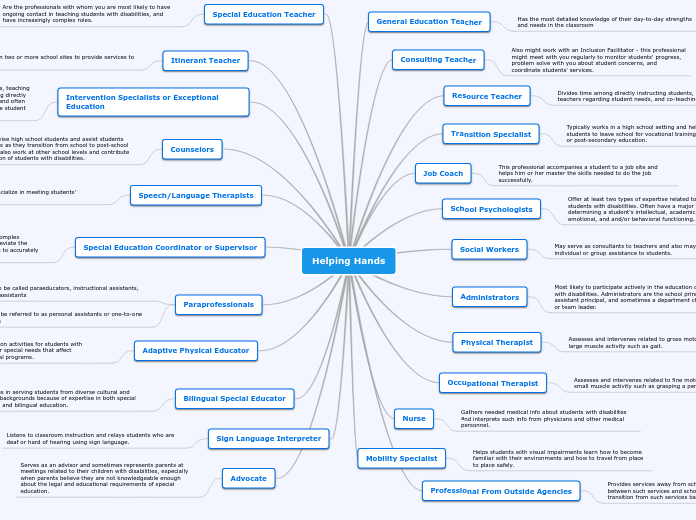Helping Hands
General Education Teacher
Has the most detailed knowledge of their day-to-day strengths and needs in the classroom
Consulting Teacher
Also might work with an Inclusion Facilitator - this professional might meet with you regularly to monitor students' progress, problem solve with you about student concerns, and coordinate students' services.
Resource Teacher
Divides time among directly instructing students, working with teachers regarding student needs, and co-teaching.
Transition Specialist
Typically works in a high school setting and helps prepare students to leave school for vocational training, employment, or post-secondary education.
Job Coach
This professional accompanies a student to a job site and helps him or her master the skills needed to do the job successfully.
School Psychologists
Offer at least two types of expertise related to education students with disabilities. Often have a major responsibility for determining a student's intellectual, academic, social, emotional, and and/or behavioral functioning.
Social Workers
May serve as consultants to teachers and also may provide individual or group assistance to students.
Administrators
Most likely to participate actively in the education of students with disabilities. Administrators are the school principal, assistant principal, and sometimes a department chairperson or team leader.
Physical Therapist
Assesses and intervenes related to gross motor skills, that is, large muscle activity such as gait.
Occupational Therapist
Assesses and intervenes related to fine motor skills. that is, small muscle activity such as grasping a pencil.
Nurse
Gathers needed medical info about students with disabilites and interprets such info from physicians and other medical personnel.
Mobility Specialist
Helps students with visual impairments learn how to become familiar with their environments and how to travel from place to place safely.
Professional From Outside Agencies
Provides services away from school and serves as the liaison between such services and school personnel, especially during transition from such services back to school.
Special Education Teacher
Are the professionals with whom you are most likely to have ongoing contact in teaching students with disabilities, and have increasingly complex roles.
Itinerant Teacher
Travel between two or more school sites to provide services to students.
Intervention Specialists or Exceptional Education
They support students by creating adapted materials, teaching with you in the general education classroom, working directly and separately with students who have disabilities, and often serving as coordinators for all the services any single student may receive.
Counselors
Most often advise high school students and assist students with disabilities as they transition from school to post-school options. They also work at other school levels and contribute to the education of students with disabilities.
Speech/Language Therapists
Are professionals who specialize in meeting students' communication needs.
Special Education Coordinator or Supervisor
Specializes in understanding the sometimes complex procedures of special education. They help alleviate the pressure on principals and assistant principals to accurately interpret and follow guidelines.
Paraprofessionals
Might also be called paraeducators, instructional assistants, teaching assistants
Also may be referred to as personal assistants or one-to-one assistants
Adaptive Physical Educator
Designs physical education activities for students with physical, health, or other special needs that affect participation in traditional programs.
Bilingual Special Educator
Specializes in serving students from diverse cultural and linguistic backgrounds because of expertise in both special education and bilingual education.
Sign Language Interpreter
Listens to classroom instruction and relays students who are deaf or hard of hearing using sign language.
Advocate
Serves as an advisor and sometimes represents parents at meetings related to their children with disabilities, especially when parents believe they are not knowledgeable enough about the legal and educational requirements of special education.
